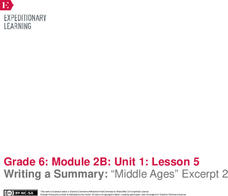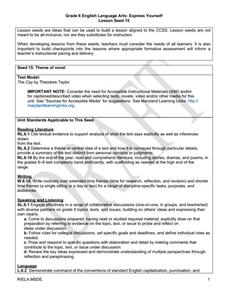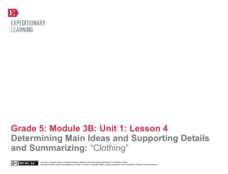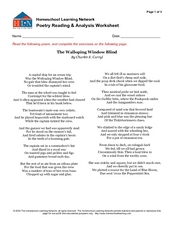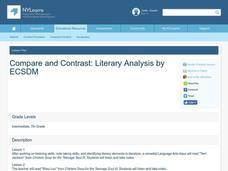Curated OER
From Graphic Organizer to Composition - Grade Six
How does one use a graphic organizer to plan writing? Introduce your writers to different types of graphic organizers by dividing the class into groups and assigning each group a particular organizer. Then, as they research chocolate...
Florida Center for Reading Research
Comprehension: Monitoring for Understanding, Simple Summary
Can your class sum up a text in a few sentences? Help them build this skill by starting nice and slow. For this summarizing activity, the teacher marks the main ideas with sticky notes. Learners read and reread the text, pausing at the...
Curriculum Corner
Informational Text Graphic Organizers
Examine informational text with a three-page worksheet that focuses on taking notes, identifying the main idea, and locating supporting details in order to form a summary paragraph.
Curated OER
Writing Summaries
Practice summary writing with informational texts. Young readers create summaries after reading magazine articles, newspaper articles, or other forms of informational texts. Readers use the GRASP strategy (read text, write what you...
Curriculum Corner
Fiction Graphic Organizers
Get an in-depth look into a narrative text with a three-page instructional activity that examines a story's character—actions, sayings, thoughts, and appearance—setting, and challenges scholars to write a brief summary about what they've...
EngageNY
Writing a Summary: “Middle Ages” Excerpt 1
What's this all about? Scholars learn the importance of summarizing skills using a summary writing graphic organizer. They work with an elbow partner to discuss summaries and complete the organizer using Middle Ages Excerpt 1. Learners...
EngageNY
Writing a Summary: “Middle Ages” Excerpt 2
What is the big idea? Scholars use Middle Ages Excerpt 2 to complete a summary graphic organizer. They then use the information from the organizer to write a summary of the text on lined paper. Learners share summaries with the class.
Curated OER
Express Yourself Lesson Seed 17: Obituary
The Cay has been criticized by groups such as the Council on Interracial Books for Children because of the way race is portrayed. Explore the argument against the book while taking the author's perspective into account. Class members...
Curated OER
Summarizing with Somebody Wanted But So
Teach your young readers how to summarize a text using a strategy called Somebody Wanted But So. Kids identify the character (Somebody), the motivation (Wanted), the conflict (But), and the resolution (So). The resource comes with...
Curated OER
Express Yourself Lesson Seed 15: Theme
Build understanding of theme with an activity designed for The Cay and the Common Core. Small groups or pairs use graphic organizers to determine themes, find and record related details from the text, and formulate theme statements. In...
Curated OER
Express Yourself Lesson Seed 18: Investigate
Prepare your class for argumentative writing with a close inspection of the controversy surrounding Theodore Taylor's novel, The Cay. All necessary articles and materials are linked at the beginning of the resource. Kids use the provided...
Curated OER
Recounts: Writing a Summary
Have your class review how to summarize a story. Learners discuss the way to write a summary and talk about the use of sequence words. The presentation uses a graphic organizer. This helps to make it a visually appealing presentation.
Freeology
Summarizing
Scholars draft a summary using a graphic organizer featuring a story's characters, setting, main events, conflict, and resolution.
Curriculum Corner
Informational Text Graphic Organizers
Scholars delve into an informational text with the help of four pages that focus on the author's purpose, vocabulary words, summarization, and main idea.
Do2Learn
Story Organizer
Kids can get all their plot points in line by filling out this graphic organizer with information from a story they have read. Pupils note down the title and author, the characters, the setting, and four events from the story.
Curated OER
Build Mastery: Sequencing
Writing a summary is much easier once you've laid out the sequence of events. Show readers how these two skills are intertwined using this graphic organizer. Review the meaning of sequencing first, presenting the chart and possibly...
EngageNY
Determining Main Ideas and Supporting Details and Summarizing: “Clothing”
Surviving winter. Pupils begin reading on page 18 of The Inuit Thought of It: Amazing Arctic Inventions and sketch how the people used animal skin clothing to survive the winter. Readers complete a main idea graphic organizer...
Curated OER
Writing Paragraphs
Bring burgers to you classroom! Print this fun graphic organizer to help beginning writers understand the most important parts of a solid paragraph. First, introduce your topic. Next, include supporting details. Finally, include a short...
Curated OER
Frindle: A Guiding Reading Unit
Guide your class through a reading of the popular children's book, Frindle, with this comprehensive literature unit. Starting with a brief introduction to the guided reading process, the class goes on to read the story two chapters...
Curated OER
Poetry Reading: Analysis Worksheet
Explore poetry by reading the poem "The Walloping Window Blind" by Charles E. Carryl, and completing an analysis with your class. The worksheet provides the entire poem, a graphic organizer to help with summarizing and paraphrasing, and...
School District of Palm Beach County
Framed Paragraphs characterization, problem and solution, symbolism, conflict
Support your learners as they work on writing paragraphs by providing graphic organizers, outlines, and frames. Sift through this packet to find the perfect organizers and templates to prepare pupils for writing. The resource...
Curated OER
Connotation and Denotation: How Word Choice Affects a Paragraph
Review the terms denotation, connotation, diction, and mood in paragraph writing. After defining the terms, middle schoolers practice writing examples of both connotation and denotation. They complete a connotation and denotation...
Curated OER
Compare and Contrast: Literary Analysis
Seventh graders are able to use active listening skills, take notes and identify literary elements of a short story. They use/create graphic organizer, compare/contrast literary elements from various stories and compare and contrast traits.
EngageNY
Building Background Knowledge: The Boy Who Invented TV, “Life before Philo”
Walk through the pictures to understand the text. Scholars analyze The Boy Who Invented TV: The Story of
Philo Farnsworth by taking a book walk and looking at the pictures. They then do a first read of Life before Philo to...






